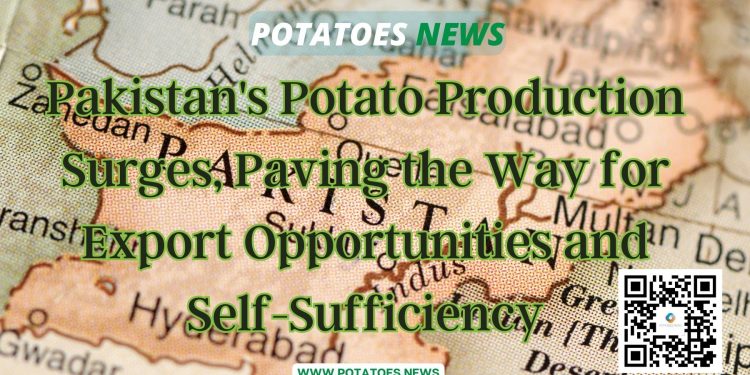In a significant agricultural development, Pakistan’s potato production witnessed a remarkable surge, reaching 7.937 million tonnes in FY22 from 5.873 million tonnes in FY21. This staggering 35 percent increase is attributed to the fortunate resilience of Punjab, the country’s potato hub, against devastating floods that swept through the region.
During a recent think tank session held at the Pakistan China Joint Chamber of Commerce and Industry (PCJCCI) Secretariat, President Moazzam Ghurki underscored the potential for Pakistan to become a leading exporter of potatoes. Despite being self-sufficient in potato production, Pakistan annually imports a substantial 20,000 tonnes of potato seeds, a practice that Mr. Ghurki suggests needs reconsideration.
One of Mr. Ghurki’s key recommendations is to boost the supply of local potato seeds, a move that not only reduces the drain on precious foreign exchange reserves but also increases the income of farmers. Currently, a significant portion, approximately 35-40 percent, of the cost of potato production is attributed to imported seeds. To address this issue, he advocates for the establishment of a large-scale tissue-culture laboratory within the country, aimed at producing affordable, high-quality seeds and thereby reducing Pakistan’s reliance on foreign seed imports.
Moreover, this surge in potato production opens up exciting possibilities for Pakistan’s agricultural sector. If Pakistan can successfully scale up the production of local, high-quality potatoes, it can capitalize on export opportunities, particularly in the Gulf region, where there is a consistent demand for agricultural products.
PCJCCI’s Senior Vice President, Fang Yulong, noted that Pakistani and Chinese enterprises are actively exploring opportunities for cooperation in the potato sector. Beyond seed production, there is interest from Chinese investors in potato by-products and opportunities in mechanized harvesting and pest control. Chinese potato varieties are known for their resistance to pests and diseases, coupled with higher yields, providing valuable insights for Pakistan to enhance its own potato germplasm.
To fully harness this potential, PCJCCI Vice President Hamza Khalid emphasized the need to ensure the localized production of high-quality seeds, coupled with advancements in planting technology and mechanization. These steps could not only lead to increased self-sufficiency but also position Pakistan as a potato-exporting powerhouse, particularly to countries with limited land resources or low potato production.
In conclusion, Pakistan’s remarkable increase in potato production is a testament to the resilience and potential of its agricultural sector. By focusing on self-sufficiency in seed production, adopting advanced technologies, and exploring export avenues, Pakistan stands poised to make a significant mark in the global potato market, benefiting its economy and farmers alike.
In conclusion, Pakistan’s remarkable increase in potato production is a clear indication of the potential and resilience of its agricultural sector. By investing in the production of high quality seed potatoes, embracing modern agricultural technologies, and exploring export opportunities, Pakistan has a unique opportunity to become a major player in the global potato market. This increased production has the potential to create numerous opportunities for Pakistani farmers, including increased income, improved access to markets, and increased food security.
The success of this increased production will depend on the continued development of seed potato production and the adoption of modern farming techniques. The government has made a commitment to increasing production and has already invested in the development of new seed varieties and the introduction of advanced farming techniques. This is essential to ensure that the quality of the produce is of the highest standard and that the potatoes can be sold in the international market.
In order to capitalize on this new opportunity, Pakistan must also focus on developing an effective export market. The government has already taken steps to open new markets for its potato exports, including the launch of a potato export scheme. This will help to ensure that Pakistani farmers can access a wide range of markets, allowing them to maximize their earnings and make a significant contribution to the country’s economy.
Finally, Pakistan must focus on creating an environment where farmers can access the technology and resources necessary to maximize their yields and ensure the quality of their products. This includes the provision of credit, access to markets, and support for the adoption of new technologies. By providing these resources and ensuring that farmers have the necessary skills and training, the government can help Pakistan’s agricultural sector reach its full potential.
In summary, Pakistan’s potato production surge is a testament to the resilience and potential of its agricultural sector. By investing in seed production, adopting advanced technologies, and exploring export avenues, the country has a unique opportunity to become a major player in the global potato market and benefit its farmers and economy alike.







